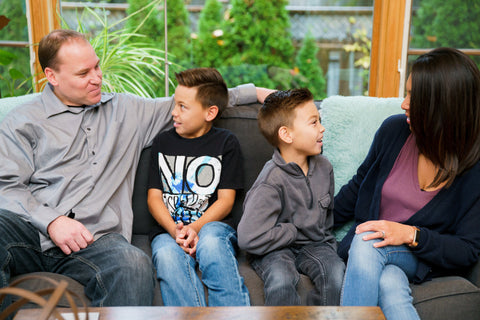When it comes to being a parent, one of the most important parts of raising your kids is constant communication. No, that doesn’t mean buying your kids phones so you can text them. I I mean you have to actually talk to them the old fashioned way.
But when it comes to communication between you and your kids, some kids can be chatterboxes and will talk your ears off while others might answer in grunts, sighs, and a language that might seem like they forgot how to use words. If you’re sending them to school, you would hope they’d learned a few words by the time they get to high school.
This is why having an open dialog with your kids has to start at an early age before they become teenagers and talking with them takes an act of congress. Before they even step foot in a school, they should already be comfortable with talking to you about things, even if you think they’re pretty pointless.
One Word Answers are Not Answers
It never fails. You as your son or daughter, “How was school.” Nine times out of ten, the response will always be “fine.” Treat the word “fine” like it’s the new f-word. “Fine” is a conversation killer. It doesn’t really answer the question sufficiently except that provides an answer.
Instead of asking a question like “how was school,” consider asking questions that can’t simply be answered with a single word. Try questions like:
- What interesting thing did you learn in school today?
- What things did you and your friends talk about today?
- Were there any questions on your test(s) you had trouble with that we might want to work on together?
- Are there any kinds of special events coming up at school you want to go to?
- What kinds of things did you do in P.E today?
- What was for lunch and what was your favorite?
Try to ask questions that require more information than just a single one word answer. Questions that can only be answered by providing additional information and will make your kids have to engage in a more interesting conversation. “Fine” is never good enough.
Always be Interested and Engaged
If you find it rude when someone else isn’t paying attention to you when you’re talking, don’t do it to your kids. Most adults have the ability to carry on conversations if they want to, and most adults have the ability to be rude and ignore someone completely. But when you’re talking to your kids and they have very little experience with having conversations, it’s your job to remain interested in whatever it is they’re talking about and keep the conversation engaging.
This is especially true when you have a quiet and shy child who doesn’t talk much or is still developing social skills. The more comfortable they are talking in general, the better they will be at communicating with friends and other adults when they it becomes necessary.
Seize the Morning
The morning hours when getting ready to start the day can be the best time to strike up conversation with your kids before they get back from school. Ask them about any special assignments or projects they’ll be working on for the day, if they know what's being served for lunch or if they’d prefer to take something instead. Questions like this will help you start a conversation when the school bell rings and you’re picking them up in the afternoon.
But beyond questions, make sure to throw in positive affirmations as well. Wish them a good day or remind them how much you love them before they get on the school bus or before they get out of the car and walk into the building. It wouldn’t hurt to throw in a few goals for them to accomplish during the day as well, such as learning at least one new thing, making a new friend, or finishing all of their lunch.
Talking with Teachers
Never forget to talk to teachers and counselors about what’s going on in school and in the classroom. Being engaged in your child’s education is always a good idea. The more you know about the goings on in your child’s school, the easier finding things to talk about will be.
Negativity Never Leads to Good Conversation
While you’re trying to think up good ice breaking questions and ways to make conversation, make sure you leave all of your negativity at the door before you talk to your child. Conversations should never feel like an interrogation. You’re trying to create a positive and engaging conversation between you and your child. The point is to establish consistent communication between both of you and so they can feel comfortable coming to you and talking about anything.
But making your questions sound more like you’re prying into their lives instead of trying to learn about their day is not going to get you anywhere. In fact, if you do this with a teenager, you risk damaging any kind of communication you’ve built with them. Instead, make sure to keep your questions positive. Instead of asking why they’re talking to a new group of people and sounding like you don’t approve, ask them to talk about their new friends and things they might have in common like certain classes, clubs, or sports.
A Family Connection
Of course, there are a vast number of ways to get your kids to chat with you, but the key is to get them comfortable talking when they’re young. The dinner table is the classic place where most conversations take place. But in the last few years, many families have abandoned the dinner table and those that still share a meal together, are more wrapped up in their phones than conversing with each other. If you feel this is your family, maybe consider making the dinner table a phone-free zone and make it a time when everyone shares their day.
When there are opportunities to share a conversation with your children, make sure to take a chance to seize them. Always keep the conversations positive and remember to actively listen and be engaged in every part of the conversation the way you’d expect someone to be with you.




Comments (0)
There are no comments for this article. Be the first one to leave a message!